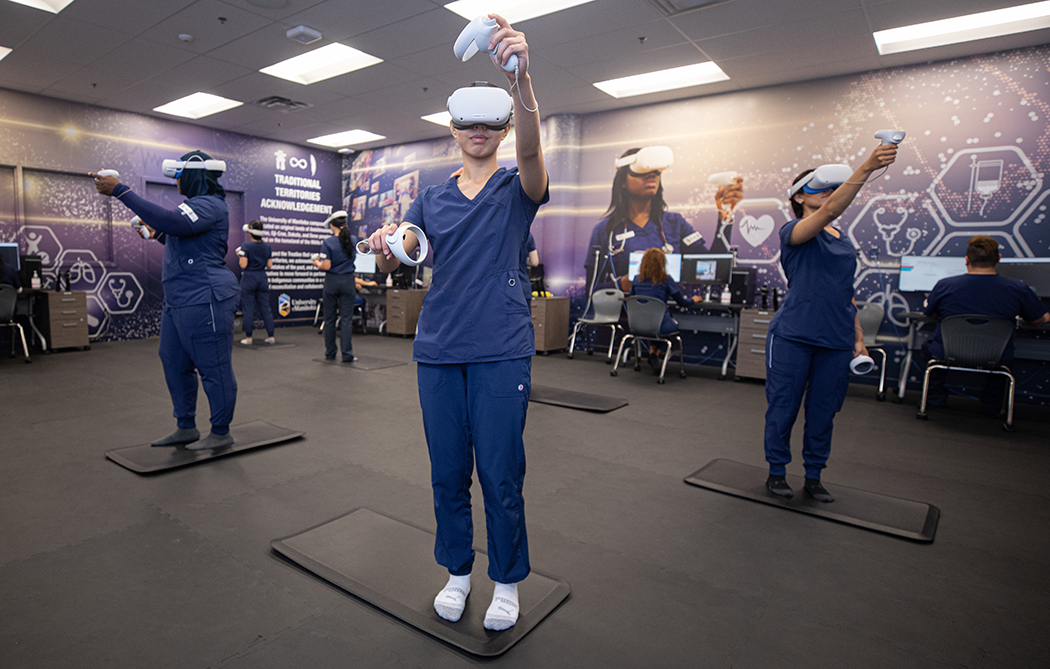
Step into a new reality in training health professionals with RadyVerse
On Friday, March 15, the Rady Faculty of Health Sciences will showcase how it will be employing virtual reality (VR) and other cutting-edge technologies to educate and train the next generation of health-care professionals. Faculty, staff and learners from across UM are invited to experience first-hand various VR and other scenarios at stations set up in Brodie Centre atrium, 727 McDermot Avenue, from 11:00 am – 3:00 pm at the RadyVerse launch event.
The faculty’s College of Nursing has been using VR in its bachelor of nursing program since Fall 2022. The RadyVerse will expand this technology across the faculty’s colleges of medicine, dentistry, pharmacy and rehabilitation sciences.
Dr. Nicole Harder, associate dean, undergraduate programs and professor in the College of Nursing, and Mindermar Professor in Human Simulation, Rady Faculty of Health Sciences, described the launch event as a “technology fair” that will give faculty, staff and students the opportunity to participate in interactive demonstrations.
“People will be able to try on the VR headsets and step into the immersive world. We’ll also have monitors where we can screencast and show others what they see in the VR, and how this will be used as an educational tool,” Harder said.
“VR has been used in other universities for some time, but not to the same extent. In the College of Nursing, it is embedded into our curriculum.”
The college recently expanded its VR simulation training to its programming in The Pas and Thompson through a partnership with the University College of the North. This allows students from different parts of the province to work together on a simulated clinical case in one virtual room.
As more disciplines become involved, interprofessional teams will not even need to be in the same physical space when collaborating, Harder said.
“VR is a great tool for learning clinical decision-making, problem solving, empathy and communication.”
Five interactive stations will be set up at the event to showcase how this technology can be used in various ways, including surgical training and conflict resolution. The event will highlight how different software programs can be used in the classroom, and how the VR scenarios can be customized.
One of the stations will be led by Dr. Lawrence Gillman, associate professor of surgery at the Max Rady College of Medicine and director of the Clinical Learning and Simulation Program at Bannatyne campus.
Gillman has a crisis-based simulation and trauma resuscitation program in development that he will soon be using to teach his residents. At the launch, he’ll demonstrate what trainers and learners will be able to do.
“This VR program is basically a playground where you can create your own sim lab in a virtual environment. You can create whatever scenarios or places you want, and people can participate together in person, or even from a distance,” Gillman said.
“Basically, we create medical crises that people can practice in and then make mistakes in simulation rather than real life.”
The event will also feature some of the ways artificial intelligence (AI) can be used in simulation and virtual reality-based learning.
“AI is fairly new, but it is going to change the way we work in simulation. Right now, when we develop the simulation experiences, we can predict the trajectory of how it will go. But with AI, avatars can respond on their own, without an instructor telling it what to do. This will make the simulations more unpredictable and, if anything, more realistic,” Harder said.
Following the launch, anyone who is interested in working with the VR technology can reach out to Gillman through the Clinical Learning and Simulation Program.
Please RSVP your attendance to the March 15 RadyVerse launch event to radyverse@umanitoba.ca.






